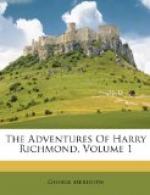My father could soon make me forget that I was transplanted; he could act dog, tame rabbit, fox, pony, and a whole nursery collection alive, but he was sometimes absent for days, and I was not of a temper to be on friendly terms with those who were unable to captivate my imagination as he had done. When he was at home I rode him all round the room and upstairs to bed, I lashed him with a whip till he frightened me, so real was his barking; if I said ‘Menagerie’ he became a caravan of wild beasts; I undid a button of his waistcoat, and it was a lion that made a spring, roaring at me; I pulled his coat-tails and off I went tugging at an old bear that swung a hind leg as he turned, in the queerest way, and then sat up and beating his breast sent out a mew-moan. Our room was richer to me than all the Grange while these performances were going forward. His monkey was almost as wonderful as his bear, only he was too big for it, and was obliged to aim at reality in his representation of this animal by means of a number of breakages; a defect that brought our landlady on the scene. The enchantment of my father’s companionship caused me to suffer proportionately in his absence. During that period of solitude, my nursemaid had to order me to play, and I would stumble about and squat in the middle of the floor, struck suddenly by the marvel of the difference between my present and my other home. My father entered into arrangements with a Punch and Judy man for him to pay me regular morning visits opposite our window; yet here again his genius defeated his kind intentions; for happening once to stand by my side during the progress of the show, he made it so vivid to me by what he said and did, that I saw no fun in it without him: I used to dread the heralding crow of Punch if he was away, and cared no longer for wooden heads being knocked ever so hard.
On Sundays we walked to the cathedral, and this was a day with a delight of its own for me. He was never away on the Sunday. Both of us attired in our best, we walked along the streets hand in hand; my father led me before the cathedral monuments, talking in a low tone of British victories, and commending the heroes to my undivided attention. I understood very early that it was my duty to imitate them. While we remained in the cathedral he talked of glory and Old England, and dropped his voice in the middle of a murmured chant to introduce Nelson’s name or some other great man’s and this recurred regularly. ’What are we for now?’ he would ask me as we left our house. I had to decide whether we took a hero or an author, which I soon learnt to do with capricious resolution. We were one Sunday for Shakespeare; another for Nelson or Pitt. ‘Nelson, papa,’ was my most frequent rejoinder, and he never dissented, but turned his steps toward Nelson’s cathedral dome, and uncovered his head there, and said: ‘Nelson, then, to-day’; and we went straight to his monument to perform the act of homage. I chose Nelson




